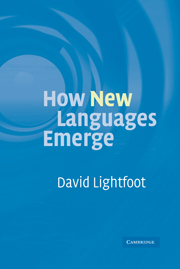Book contents
- Frontmatter
- Contents
- Preface
- 1 Internal languages and the outside world
- 2 Traditional language change
- 3 Some properties of language organs
- 4 Languages emerging in children
- 5 New E-language cuing new I-languages
- 6 The use and variation of grammars
- 7 The eruption of new grammars
- 8 A new historical linguistics
- References
- Index
Preface
Published online by Cambridge University Press: 02 February 2010
- Frontmatter
- Contents
- Preface
- 1 Internal languages and the outside world
- 2 Traditional language change
- 3 Some properties of language organs
- 4 Languages emerging in children
- 5 New E-language cuing new I-languages
- 6 The use and variation of grammars
- 7 The eruption of new grammars
- 8 A new historical linguistics
- References
- Index
Summary
Newspapers tell us that languages are dying out at an alarming rate but they do not tell us that new languages are always emerging. To explain the emergence of new languages with new structures, one needs to understand how languages change and how they emerge in children, like new plants growing and spreading. In fact, we need some new understanding, because the most usual models of change and of the acquisition of language by children make it hard to think of how new languages can emerge; we need new models.
This book aims to investigate not new meanings or new pronunciations but how new systems might arise and be acquired by children, who are the vehicles for structural shifts, I argue. Languages undergo big changes from time to time and adults and children play different, complementary roles.
Linguists have always been interested in language change. Linguistics first became an independent discipline in the nineteenth century and at that time it was concerned exclusively with the history of languages, trying to understand how languages became the way they are. The nineteenth century can be seen as the century of history. Linguists wanted to know how languages changed, biologists wanted to know how species changed, and political thinkers wanted to know how societies and political systems changed; they read each other and gave similar kinds of answers.
- Type
- Chapter
- Information
- How New Languages Emerge , pp. vii - xPublisher: Cambridge University PressPrint publication year: 2006



